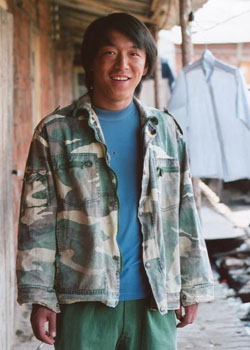I was taking a stroll through Xin Tian Di, a renovated cobblestone neighborhood that is popular with tourists and with locals who want to see and be seen. Just as I was about to cross the narrow lane that separates the two portions of the plaza I saw a middle-aged Chinese man in shabby blue working clothes craning his neck to look into the plaza across the lane from me. A private security guard walked up to the workman and blocked the workman’s view. Then he gestured crossly at the workman, and said something gruffly. The workman became agitated and responded in kind. The security guard stepped menacingly toward the workman, who stepped back, offered one last word in defense of his self-respect, then walked away.

As the lane opened for pedestrian crossing I considered that the workman was clearly from the countryside – one of the “Floating Population” the local governments needed to build their roads and buildings and clean their streets and apartments – and that he may even have participated in the renovation of the very same neighborhood that made it a cash cow for its private owners and government nannies. And yet, there he was, denied access to a public venue by a kid who was more likely than not himself from the countryside. Though there were no signs outside the walking street that prohibited the entry of migrant workers – as there had been signs at park entrances in Shanghai during the colonial occupation of China that read, “No Dogs or Chinese Allowed” – it was clear Shanghai practiced a bifurcated social system against its own citizens. Ironic, as I told one Western friend, as likely 80% of all Chinese now in the Chinese cities are first- or second-generation country “bumpkins.” Indeed, it is an insult to city dwellers to either indicate or call them out right nong min – peasants.
Most of the protests that have sprung up in China in the new century reflect the stresses and strains of a country that is urbanizing at a rate not seen in nearly a century, when American immigrants just off the boat at Staten Island would be shoved into the nearest ethnic ghetto.
In China, though, the leadership is trying to move a population nearly twice the size of the today’s United States into cities. In the same way American neighborhoods in New York boroughs erupted into protest as eminent domain mowed down their row houses to make way for superhighways, Chinese in cities of all sizes are trying to adapt to the waves of migrant workers that are trying to make a better life for themselves, while at the same the migrants are trying to keep from being kicked off the few rungs of the wealth ladder they’ve been able to cling to. Throughout the country great stresses and strains daily show themselves, and sometimes erupt in violent and unexpected ways.
And yet China needs its migrant workers. In the same way America needed immigrants from Europe to build its cities and workers from China to construct its railroads; in much the same way as Germany required Turkish labor to rebuild its war-savaged towns; and the rich Arab countries need Indian and Filipino workers – China needs its Chinese migrants. Without the numbers and “hunger” of its countryside cousins, the cities can neither have the hands and backs it needs to build and expand its urban centers, nor will it have the bodies to reside in the acres and acres of flats that now lay empty, waiting for some strange alchemy that will turn them from fool’s gold into something practical, yet likely unobtainable by the millions who built them.
This is China! Blog
Warning:The use of any news and articles published on eChinacities.com without written permission from eChinacities.com constitutes copyright infringement, and legal action can be taken.
All comments are subject to moderation by eChinacities.com staff. Because we wish to encourage healthy and productive dialogue we ask that all comments remain polite, free of profanity or name calling, and relevant to the original post and subsequent discussion. Comments will not be deleted because of the viewpoints they express, only if the mode of expression itself is inappropriate.
Please login to add a comment. Click here to login immediately.